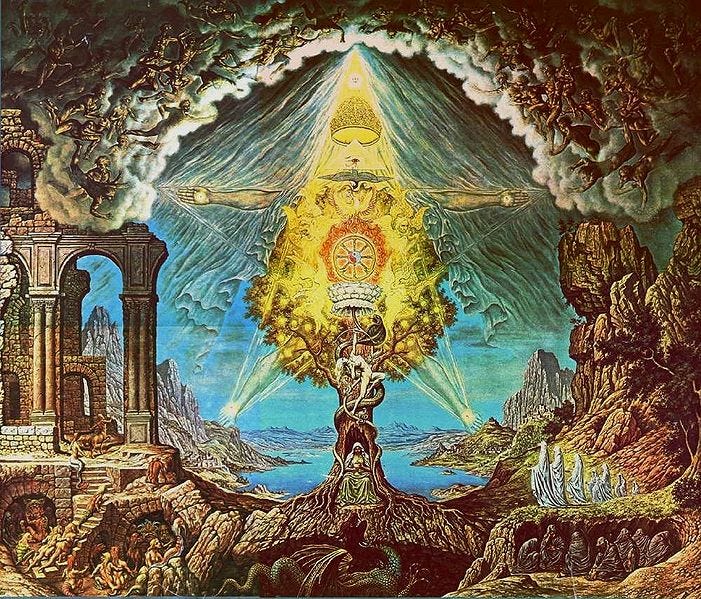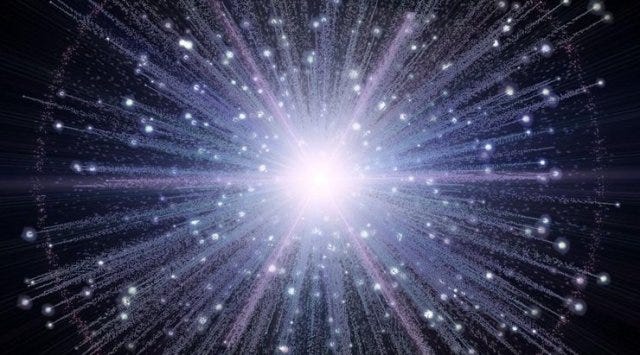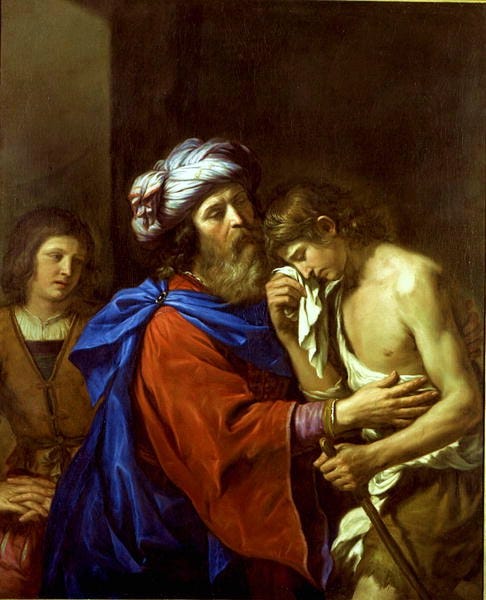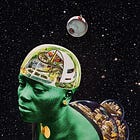Gnostic Thought and Myth Pt. 2: How did Gnostics view the world?
Blasphemous to some, inspiring and enlightening to others. The Gnostics truly exposed how dumb Christianity truly was.
Unlike Christianity, which has over 45,000 denominations, the Gnostics were very straightforward in their view of the cosmos.
Their approach was very blunt, offensive to most devout and orthodox Christians at that time.
The fundamental premise of Gnosticism was that man has the ability to have a direct connection to the Divine. Intercession by the priests, clergymen, and the Church was completely unnecessary. Spirituality, apart from religion - which the priests made synonymous for their perverted agendas - involves liberating the soul from the earthly shackles by realizing the Divinity within oneself, just like Jesus said. This all stems from their no-nonsense view of the cosmos, the world and themselves.
Mythology as Reality
Mythology was very prevalent in ancient times. Unlike today, where “myth” has a double meaning - “myths explain why the world is the way it is” vs. something imaginary, fictional, with no basis in reality - myths were the law of the land.
Temples were built, animals were sacrificed, rituals were undertaken, cosmic occurrences were synchronistic confirmations, and Universal principles represented by deities were revered.
The Gnostic Myth was no different. There are numerous different versions of the different Gnostic texts. Bentley Layton’s The Gnostic Scriptures, one of the paramount translations of the original texts will be referenced as we explore the key themes behind the mythology and way of thinking as a whole.
The Gnostic Worldview
Gnostics view the world as imperfect and flawed, by default.
On the contrary, the Christian account of creation places all blame on humans. Hence, the concept of original sin, your soul being “naturally” blemished due to the disobedience of the originals. The flaws of everything in life is due to the failure of the first human pair: Adam and Eve. This deems one automatically helpless, naive, and a subordinate. No divinity present, just a being whose job is to serve and make up for the mistake of its forebears. That is the fundamental basis of Christianity right at the beginning of the book. There was paradise and then humans spoiled the fun…if they just would have listened.
However, Gnostics hold that this flaw is not just pervading the entire realm because of some mistake; it only exists because its creator is flawed. This creator is who we refer to as the “Old Testament God”. We’ll get back to this in a second..
The Suffering of the World
Not only was the creator flawed but…life is full of suffering. There is constant pain and whatever pleasure you do feel is temporary. On every hand, there is some sort of heartbreak, disappointment, betrayal, and an ever present interruption to peace, happiness, and stillness.
This sounds very pessimistic but it is true. When you observe nature for what it truly presents, you can clearly see that this concept is present in every plane of existence.
Even if you are a vegetarian, your diet is sustained at the expense of the lives of plants. Yes, they are living individuals as well.
In the light of all of this, people love to deem the world a bright and happy place. Gnostics looked at the world directly in the face. This is what it is and there is no denying it.
This suffering is a result of ignorance, that of the spiritual and material. As we have discussed, the material is the after-effect and congealed form of the spirit.
Therefore, when you raise your awareness to higher spiritual realities, you can release the binds of the material. All of the material attachments and distractions. You can release your soul and return to your home beyond the material, back to that of the Divine.
Distractions are everywhere.
The created world, including a major portion of the human mind, is seen as evil by the Gnostic primarily because it distracts consciousness away from knowledge of the Divine.
Physicality inevitably attracts one to the external (psychology calls this “extroversion”), while the turbulence of the personal mind focuses attention on itself. Through this double distraction, the inner self is forgotten. - Hoeller, p. 16
Your inner self is the direct connection to your Divinity, the Source from whence you came.
Religion, moral dogma, societal conditioning and “correctness”, parental programming, and the inherent suffering of the realm imbued into every circumstance are all distractions from realizing who you truly are.
Distractions equate to ignorance due to the influence on where you prioritize your attention.
The true original sin to the Gnostics was not that of Adam and Eve, but of the separation of the human from the Divine. Whatever upholds that separation, often referred to as māyā, that illusion of separation and impermanence, is what is the true enemy, evil, and “original sin”. Simply put, everything that has to do with being here and being human. As long as your soul is trapped in the human body, that is your fight.
Creation from a Flawed Deity
Gnostics made it very clear that the Adam and Eve story could not have been true. From any perspective.
The inherent suffering in this world could not have been caused by two individuals. The imperfections, in everything, goes far beyond the responsibility of man to be morally perfect.
The Fall of Man, given to two individuals, could not have occurred. It was imperfect from the get-go.
Creation as Emanation
As we have discussed in our Christian Corruption of Cosmology series - if you have not checked it out, I HIGHLY suggest you do - Creation is a process, not a singularity. Out of the ALL, the “initial” all-encompassing, inactive, asleep state of the Universe did everything emanate. Contrary to the seven day creation period and then “done”, creation just ending.
The Gnostics saw the Creator as something beyond morals, reason, and pure creation in itself. This is likened to the metaphysical and esoteric worldview. Constant expansion through constant ideation, passing down this creative essence.
Out of the inactive and unmanifested did the process of Causation emanate into infinite expansion, creative activity, intelligence in motion, and manifestation. Every other deity after the Original being an extension, an emanation, yes, but also a subordinate deity.
To give a clearer perspective, we must use analogy. As with the ancient mind, mythology and symbolism efficiently and effectively connected the dots, deciphering the unknown from the known. In this case, we will discuss a landowner choosing to develop a piece of land. An experience we have been seeing with all these wonderful technological advancements and city growth.
If the landowner becomes less and less involved in the development and the chief architect inept and his workers slovenly, then in spite of the good intentions of the owner, the final results will be anything but perfect. - Hoeller, p. 17
This subordinate deity in Gnostic mythology is known as the Demiurge. From the Greek demiurgos, meaning “half-maker, because he is responsible for the material universe, not for what is within. Him and his workers, known as archons, are responsible for the material happenings in this earthly realm.
The Divine Spark Within
Gnosticism places emphasis on the essence of man, that which is connected to the Divine. When we speak of cosmology, we speak of Causation, which results from energy and the intelligence/consciousness guiding that energy. This results in the form and the essence of the form.
The intelligence within man is directly connected to the initial intelligence of the Universe. Hence, why we have the intuition, senses beyond the five, the imagination being the ability to form new concepts, ideas, and images, etc.
This Divine Intelligence within is referred to as the Divine Spark. When one becomes aware of this Divinity within, ignorance is dispelled leading to true soul liberation.
However, the Demiurge and his archons, his “petty rulers”, oversee the material realm, including the physical body. Being a flawed deity means you are ignorant of that which made you. As with the idea of causation, the ideation is present in the creation. The energy of ignorance rules Earth because its Creator passed that gene into its “creations”. The archons assist in keeping one ignorant, thereby being slave masters of the souls entrapped in physical bodies. Ignorance of self is the true enemy.
Cosmic events play out again and again, but in different forms. This Divine Spark encased in the ignorant is that initial creative spark that arose from within, liberating itself, undergoing the infinite process of Causation which is Creation. This represents the initial state of the Universe: unmanifested, inactive, motionless, unaware and asleep. Escaping the Garden of Eden, that state of “perfection” was the storyform version of this that the priests unfortunately used to manipulate the minds of the masses.
Remember: this Divine Spark is within, whether you are aware of it or not. Once you are aware, you are a threat to the realm, just like Jesus was. You undergo the process of soul liberation by self-awareness. But there is no need to fear, for self-knowledge is the purpose of the Universe, the qualifying of the quantified “creation”. That is where true spirituality dwells, not in filling the church coffers for an afterlife Heaven.
Ignorance of self is the true sin, not from some forbidden apple.
A flawed creator with flawed helpers supporting the ignorance of its creations’ connection to Divinity above him. Sounds like the Old Testament God:
"Thou shalt not bow down thyself to them, nor serve them: for I the Lord thy God am a jealous God..."
"For thou shalt worship no other god: for the Lord, whose name is Jealous, is a jealous God:"
"(For the Lord thy God is a jealous God among you) lest the anger of the Lord thy God be kindled against thee, and destroy thee from off the face of the earth."
What would you be jealous of if you are who you say you are?
This jealousy must stem from something within you creation; the possibility that they know more and are more than you.
These are the questions the Gnostics proposed, pondered, and spread the word about. This agenda from “God” to keep one ignorant and asleep is jealousy in action.
Ignorance of the true spiritual reality is why gnosis, experiential knowledge is important. Your salvation lies in direct first-hand experience with the Divine which is possible. However, this realm is upheld by the ignorance of that which is within. Just to give you a sense of how radical these people were, they were saying this before the Inquisitions, before the Crusades, before the jihads, right in the midst of Christendom being expanded through Constantine and his treachery.
Attachments to earthly pleasures, the impermanent illusions, are what keeps the soul entrapped in the cycle of reincarnation. Ignorant in one life, being recycled into the next one just as ignorant. Unless gnosis is attained. When you transform your consciousness to a higher state, that is when you escape that vicious cycle of signing up to be ignorant, enduring suffering right up to your spiritual checkpoint from your last life.
Contrary to the Christian fundamentalist thinking, your salvation is not through vicarious atonement or a Divine Avenger. It is not a group project with your church buddies or Bible Study group. It is what most Christians claim to walk but routinely show otherwise. Going to church, paying for sacraments, subscribing to moral dogma, and spreading the “fire and brimstone” Doomsday message has no alignment with salvation, whatsoever. Salvation is an individual experience, a personal relationship, and a spiritual process because it is your soul that is entrapped in your physical body.
There are those who know and there are those who do not know. Not knowing is what some would consider sin, coming from the Greek hamartia, meaning “missing the mark”.
The world was not created perfect, its present state is not the result of a fall, and the human race did not incur an original sin passed on to all men and women. Consequently there is no need for God’s son to be sacrificed in order to pacify his wrathful Father and thereby save humanity. Hoeller, p. 20
The Gnostic Worldview…Revisited
To be very clear, the Gnostics have no theology and they do not practice doctrines. They are simply about knowledge of self.
Their scriptures are mythical in essence. Hence, why they could have various schools of thought, different myths, and they could exist simultaneously.
Check out my African Cosmology series, where you will clearly see the four major cities of Kemet (Thebes, Memphis, Heliopolis, and Hermopolis) along with their creation accounts built off each other and existed right alongside one another.
That is what happens when the texts are myths, not literal and dogmatic like the Christian faith. Hence why they feel like they have to make people believe it.
Beloved, when I gave all diligence to write unto you of the common salvation, it was needful for me to write unto you, and exhort you that ye should earnestly contend for the faith which was once delivered unto the saints. - Jude 1:3
Self-knowledge, gnosis, needs no defense for it is true to you, needing no validation.
In the next few articles of this series, we will be exploring the Gnostic Creation Myth, its key players, facets, and cosmic principles that live on to this day. As with all of my writings, I appreciate you reading and do your due diligence and know yourself. I’ll see you next Thursday!
Sources:
Gnosticism: New Light on the Ancient Tradition of Inner Knowing by Stephan A. Hoeller









